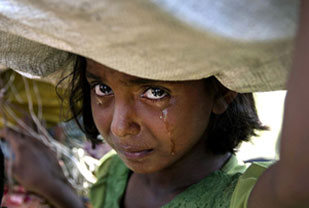Women’s Land Rights Are Human Rights
Disaster Risk


This year on Human Rights Day, 10 December, consultations with sugarcane women farmers were held simultaneously in Meerut, Muzaffarnagar and Saharanpur in Uttar Pradesh. The main objective was understanding “Women and Land Rights as Human Rights”. These consultations were attended by women farmers and members of the civil society organisations working on issue of sugarcane farmers, retired bureaucrats (Prabhat Rai in Meerut), and a few local activists.
Discussions were held on basic human rights and constitutional guarantees, amendment of Hindu Succession Act which is in favour of women and their land and property rights, and the structure and functioning of Human Rights Commissions (both state and national). But with farmers in consultation, discussions around farming and agriculture was inevitable. And so it began.
In Meerut, one of the farmer shared some organic farming concept which was much appreciated by the participants and demand for such training was raised. Women farmers in group discussions highlighted issues of gender pay gap, of the fact that Minimum Support Price (MSP) was not guaranteed by the state and so farmers were forced to sell sugarcane at throwaway prices to local kolhu, the rise in input cost of sugarcane farming due to a hike in diesel prices, fertiliser and the subsequent decrease in profits. The women farmers highlighted that it was due to falling profits that many were forced to migrate.
The occasion and the discussions that ensued was apt for women to be made aware of their rights over the land they cultivate.
*
Oxfam India is working on “Ensuring rights and entitlements of Informal Sector workers” and Responsible Sugar Supply Chain is a part of this work. Oxfam India has been working on sugar supply chain mainly on issues of small holder farmers, migrant workers in the states of Uttar Pradesh (Meerut, Muzaffarnagar and Saharanpur districts) and Maharastra (Beed, Osmanabad and Ahmednagar districts). It has produced two critical research Human Cost of Sugar (Uttar Pradesh & Maharashtra) in both the states and they form the basis of the programme currently implemented in both the states.
In Uttar Pradesh, our focus is on women and land rights. This is in the context that nearly 85% rural women are engaged in agriculture but only 13% own land. However, the latest NFHS report indicates States like UP, Chhattisgarh, Jharkhand, Punjab reported huge improvement in women ownership of house/land alone or jointly; UP, however, saw a jump from 34.2% to 51.9%. The numbers are a bit iffy and thus there is a need for a ground level reality check on the same.
An earlier attempt to recognise women as farmers and raise awareness on their land rights was done through Aaroh Campaign that ran for nearly a decade in Uttar Pradesh. It was a success given that at least women farmers were being recognised as farmers by the media, the society and in the official circuits. In this context, it is thus important to engage with women farmers and try to gauge their current issues.
The very choice of Human Rights Day was significant to drive home the point of women and land rights. It is important that land rights for women is realized as an integral part of human rights and women are mobilized around the same to demand for more land and property rights in their name. This is one huge step towards building women’s agency and ending gender discrimination.
📢Oxfam India is now on Telegram. Click here to join our Telegram channel and stay tuned to the latest updates and insights on social and development issues.
Check you latest news


